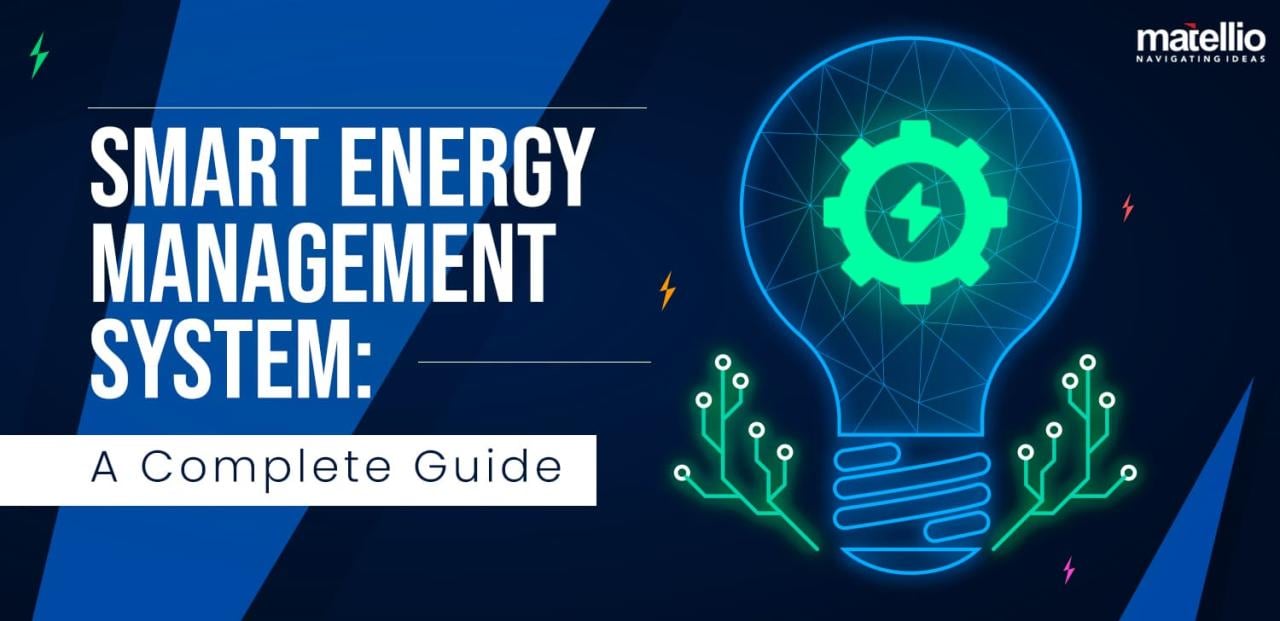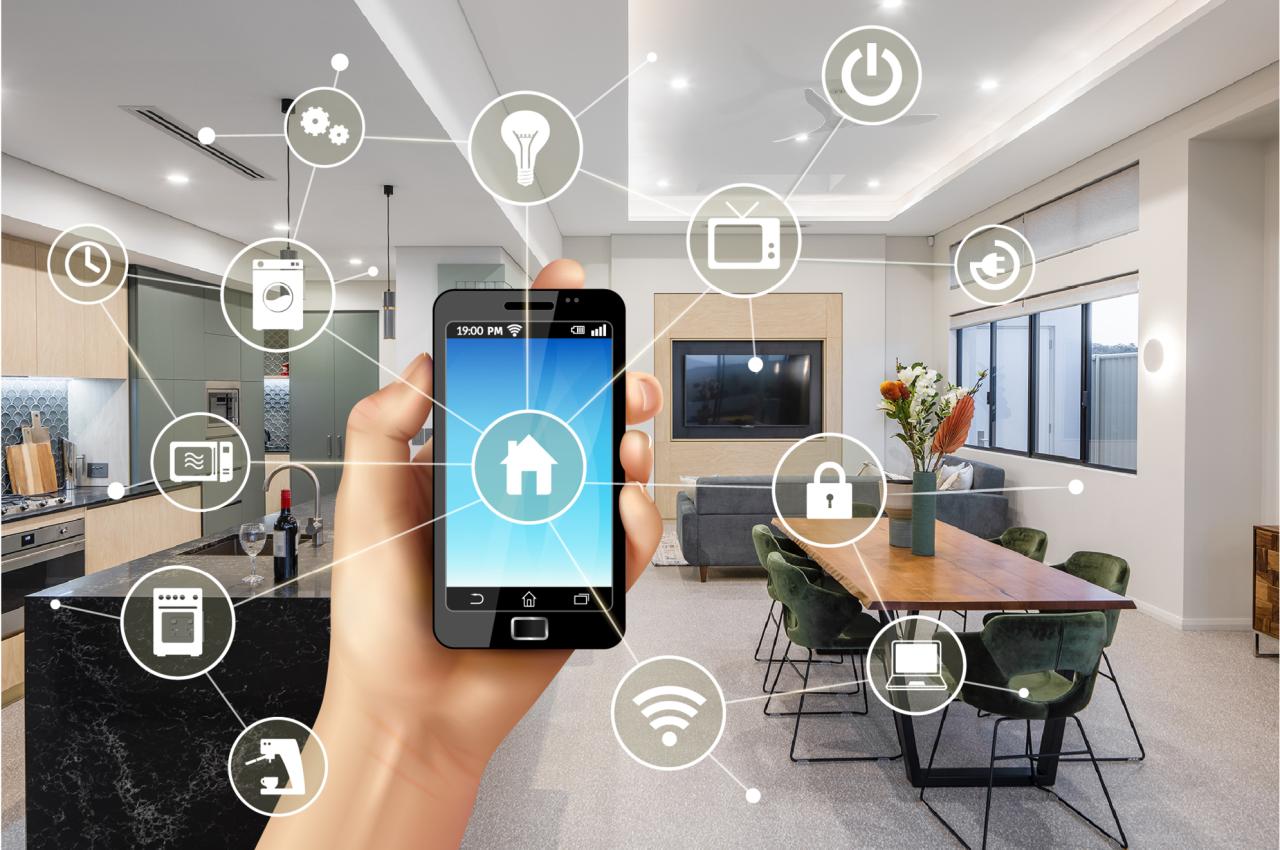Smart energy management opens the door to a world of innovative technologies and sustainable practices, promising a brighter future for energy consumption.
With the increasing focus on efficient energy usage, it’s vital to explore the key components and benefits of smart energy management systems.
Overview of Smart Energy Management
Smart energy management involves the use of advanced technologies and strategies to optimize the consumption, generation, and distribution of energy in a more efficient and sustainable manner. By leveraging data analytics, automation, and smart devices, organizations and individuals can monitor, control, and reduce their energy usage while minimizing waste and environmental impact.
Technologies Used in Smart Energy Management
- Smart Meters: These devices track energy consumption in real-time, providing valuable data for analysis and optimization.
- Energy Management Systems (EMS): EMS software helps organizations monitor, control, and optimize their energy usage across various devices and systems.
- Building Automation Systems (BAS): BAS enable centralized control of building systems such as lighting, HVAC, and security to optimize energy efficiency.
- Renewable Energy Sources: Technologies like solar panels and wind turbines enable the generation of clean, sustainable energy that can be integrated into smart energy management systems.
Benefits of Implementing Smart Energy Management Systems
- Cost Savings: By optimizing energy usage and reducing waste, organizations can lower their energy bills and operating costs.
- Environmental Sustainability: Smart energy management helps reduce carbon emissions and environmental impact by promoting energy efficiency and the use of renewable energy sources.
- Improved Reliability: By monitoring energy consumption and system performance in real-time, organizations can identify and address issues proactively, minimizing downtime and disruptions.
- Increased Efficiency: Smart energy management systems automate processes and optimize energy usage, leading to improved operational efficiency and productivity.
Key Components of Smart Energy Management Systems
Smart energy management systems rely on a combination of essential components to effectively monitor and optimize energy consumption. These components work together to ensure efficient utilization of resources and cost savings.
Types of Sensors Used in Smart Energy Management
In smart energy management systems, different types of sensors play a crucial role in collecting data and providing valuable insights into energy usage. Some common sensors include:
- Smart Meters: These devices measure and record the energy consumption of a building or facility in real-time, providing accurate data for analysis and monitoring.
- Occupancy Sensors: By detecting the presence of people in a room, occupancy sensors can adjust lighting, heating, and cooling systems to optimize energy usage based on occupancy patterns.
- Temperature Sensors: Monitoring temperature levels allows for precise control of heating and cooling systems, ensuring energy efficiency without compromising comfort.
- Luminance Sensors: These sensors measure light levels in a space, enabling automatic adjustment of lighting based on natural light availability, reducing energy waste.
Role of Data Analytics in Optimizing Energy Consumption
Data analytics plays a crucial role in smart energy management by analyzing the vast amount of data collected by sensors to identify trends, patterns, and anomalies in energy usage. This information is used to optimize energy consumption in the following ways:
- Energy Monitoring: Data analytics provides real-time insights into energy consumption patterns, allowing for immediate adjustments to optimize usage and reduce waste.
- Predictive Maintenance: By analyzing historical data, predictive maintenance models can anticipate equipment failures and inefficiencies, enabling proactive maintenance to prevent energy losses.
- Energy Efficiency Recommendations: Data analytics can generate personalized recommendations for improving energy efficiency based on individual usage patterns and preferences, empowering users to make informed decisions to reduce consumption.
Implementation of Smart Energy Management in Residential Settings

Smart energy management systems can greatly benefit homeowners by helping them save money on their energy bills and reduce their environmental impact. Installing these systems in residential settings involves a few key steps to ensure optimal efficiency and effectiveness.
Installation Process of Smart Energy Management Systems
- Consult with a professional: Before installing a smart energy management system, it is advisable to consult with a professional to assess your home’s energy needs and determine the best system for your specific requirements.
- Choose the right system: Select a smart energy management system that integrates seamlessly with your home’s existing infrastructure and is user-friendly for easy monitoring and control.
- Install sensors and devices: Set up sensors and devices in strategic locations throughout your home to track energy usage and provide real-time data for analysis.
- Connect to a central hub: Ensure all components of the smart energy management system are connected to a central hub or control panel to enable communication and coordination between devices.
- Monitor and optimize: Regularly monitor your energy consumption data and make adjustments to optimize the performance of your smart energy management system for maximum efficiency.
Tips for Efficient Use of Smart Energy Management Tools
- Set personalized schedules: Take advantage of scheduling features on smart energy management tools to adjust temperature settings, lighting, and appliances based on your daily routine.
- Utilize remote access: Use mobile apps or online platforms to remotely monitor and control your home’s energy usage, allowing you to make changes even when you’re away from home.
- Implement energy-saving modes: Activate energy-saving modes on your smart devices to automatically reduce energy consumption during off-peak hours or when you’re not at home.
- Regular maintenance: Keep your smart energy management system up-to-date and perform regular maintenance checks to ensure all components are functioning properly and efficiently.
Contribution of Smart Thermostats to Energy Savings at Home
Smart thermostats play a crucial role in reducing energy wastage and optimizing heating and cooling systems in residential settings. By allowing homeowners to set precise temperature settings, create personalized schedules, and remotely control their home’s climate, smart thermostats can lead to significant energy savings over time. Additionally, features like learning algorithms and occupancy sensors help smart thermostats adapt to your lifestyle and preferences, further enhancing energy efficiency and comfort in your home.
Smart Energy Management in Commercial and Industrial Settings
Smart energy management plays a crucial role in the success and sustainability of businesses operating in commercial and industrial sectors. By implementing smart energy solutions, companies can achieve significant cost savings, improve operational efficiency, and reduce their environmental impact.
Benefits of Smart Energy Management for Businesses
- Enhanced Cost Savings: Smart energy management systems help businesses optimize their energy usage, leading to reduced utility bills and operational expenses.
- Improved Operational Efficiency: By monitoring and analyzing energy consumption data in real-time, companies can identify areas for improvement and implement strategies to enhance efficiency.
- Environmental Sustainability: Implementing smart energy solutions allows businesses to reduce their carbon footprint and contribute to a more sustainable future.
Challenges in Integrating Smart Energy Management Systems
- Initial Investment Costs: The upfront costs associated with implementing smart energy management systems can be a barrier for some businesses, despite the long-term savings potential.
- Complexity of Integration: Integrating smart energy solutions in large-scale operations can be challenging, especially when dealing with legacy systems and infrastructure.
- Data Security Concerns: With increased connectivity and data sharing in smart energy systems, businesses need to address cybersecurity risks to protect sensitive information.
Question Bank
How can smart energy management benefit residential settings?
Smart energy management in homes can lead to reduced energy bills, increased comfort, and a more environmentally friendly lifestyle.
What role do sensors play in smart energy management systems?
Sensors are essential in monitoring energy consumption, enabling data-driven decisions to optimize energy usage effectively.
Why is smart energy management crucial for businesses?
Businesses can benefit from cost savings, improved operational efficiency, and a reduced carbon footprint through smart energy management solutions.







